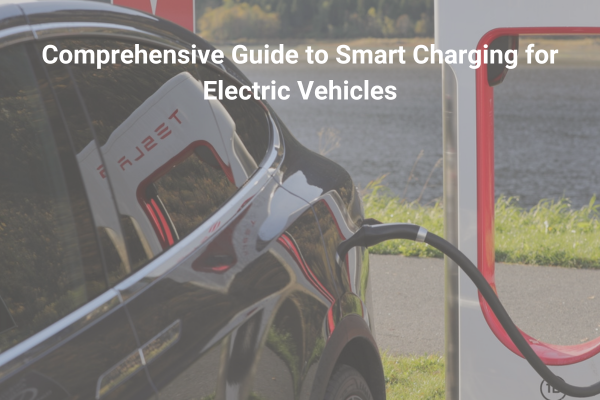Comprehensive Guide to Smart Charging for Electric Vehicles


This blog will explore essential maintenance tips specifically tailored to electric vehicles. From battery care to tire maintenance and software updates, we will cover various aspects that contribute to the overall health and performance of your EV.
Let's explore the essential components of an electric vehicle.
Battery Pack: The battery pack is the heart of an electric vehicle. It stores and supplies electrical energy to power the vehicle. Regular maintenance of the battery pack involves monitoring its state of charge, ensuring proper cooling, and following manufacturer guidelines for charging and discharging.
Electric Motor: The electric motor is responsible for converting electrical energy from the battery into mechanical energy to propel the vehicle. Electric motors are generally reliable and require minimal maintenance. However, it's essential to periodically check for any signs of abnormal noise, vibration, or overheating.
Charging System: The charging system includes the charging port, onboard charger, and associated electronics. It's crucial to follow proper charging practices, use compatible charging equipment, and keep the charging components clean and free from damage.
Regenerative Braking System: EVs utilize regenerative braking, which converts kinetic energy during braking into electrical energy to recharge the battery. This system helps extend the range and improve overall efficiency. Regular inspection and maintenance of the regenerative braking system will ensure its optimal performance.
Cooling System: Electric vehicles rely on cooling systems to regulate the temperature of the battery pack, motor, and power electronics. Proper maintenance of the cooling system involves checking coolant levels, inspecting hoses and connections, and ensuring efficient heat dissipation.
Tires: Like any vehicle, tires play a critical role in safety and performance. Regular tire maintenance includes checking tire pressure, tread depth, and overall condition. Rotating tires regularly promotes even wear and extends their lifespan.
Software Updates: EVs often receive software updates from manufacturers to enhance performance, address potential issues, and introduce new features. Staying up to date with software updates ensures your vehicle benefits from the latest improvements.
Battery Maintenance:
Follow the manufacturer's guidelines for charging and discharging the battery. Avoid overcharging or fully depleting the battery regularly.
Keep the battery cool and avoid exposing it to extreme temperatures.
Regularly inspect the battery for any signs of damage or corrosion and address them promptly.
If your vehicle has a plug-in hybrid system, ensure that the internal combustion engine is properly maintained.
Tire Care:
Check the tire pressure regularly and maintain it at the recommended level. Properly inflated tires improve energy efficiency and ensure better handling.
Rotate the tires per the manufacturer's recommendations to ensure even wear and prolong lifespan.
Inspect the tires for any signs of damage, such as cuts or bulges, and replace them if necessary.
Use tires specifically designed for electric vehicles, as they are optimized for low rolling resistance and improved efficiency.
Brake System:
Electric vehicles rely more on regenerative braking, which reduces wear on the traditional friction brakes. However, it is still essential to check the brake pads and rotors regularly.
Pay attention to any unusual noises or vibrations while braking and have them inspected by a professional if needed.
Follow the manufacturer's recommendations for brake fluid replacement.
Cooling System:
Keep the cooling system in good condition to ensure optimal performance and prevent overheating of components.
Regularly check the coolant level and top it up if necessary.
Inspect the cooling system for any leaks or signs of damage and have them repaired promptly.
Software Updates:
Stay up to date with software updates provided by the manufacturer. These updates often include improvements in performance, energy efficiency, and additional features.
Regularly check for software updates and install them as recommended.
Cabin Air Filter:
Replace the cabin air filter as per the manufacturer's guidelines to maintain good air quality inside the vehicle.
A clean cabin air filter improves the efficiency of the heating, ventilation, and air conditioning (HVAC) system.
General Maintenance:
Regularly check and top up other fluids such as windshield washer fluid and brake fluid.
Keep the vehicle clean, both inside and out, to maintain its appearance and prevent damage.
Follow the manufacturer's recommended service intervals for inspections and maintenance tasks.
Consult the owner's manual for specific maintenance requirements and guidelines.
In conclusion, proper maintenance is key to keeping your electric vehicle running smoothly and maximizing its performance and efficiency. By following the maintenance tips outlined above, you can ensure that each electric vehicle component is well-maintained and functioning optimally.
If you're looking for further guidance or professional assistance with maintaining your electric vehicle, don't hesitate to reach out to authorized service centers or consult your owner's manual. Taking proactive steps to care for your electric vehicle will not only extend its lifespan but also contribute to a sustainable and enjoyable driving experience.